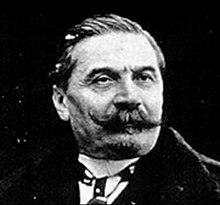| Vittorio Calcina | |
|---|---|
 | |
| Born | (1847-12-31)31 December 1847 Turin, Piedmont Italy |
| Died | 31 December 1916(1916-12-31) (aged 69) Milan, Lombardy Italy |
| Occupation(s) | Filmmaker director |
| Years active | 1896–1905 |
Vittorio Calcina (31 December 1847 – 31 December 1916) was the first Italian filmmaker in history.
Biography
Born in Turin, Calcina was a photographer by profession, he was the Lumière brothers' representative for Italy from 1896. In that year:
- he was the creator of the first filming of a pope, when he immortalized Pope Leo XIII in the Vatican Gardens on 26 February 1896;
- on 23 October 1896, Calcina asked the municipality of Brescia for the concession of the San Luca Hospital to carry out, in the rooms of the "Forza e Costanza" gymnasium, the screening with cinematograph of Il bagno di Diana by Giuseppe Filippi;
- on 7 November 1896 he organized a screening of about 20 films by the Lumière brothers in the former Hospice of Charity in via Po 33 in Turin.
He then became the official photographer of the House of Savoy, the Italian ruling dynasty from 1861 to 1946. In this role he filmed the first Italian film, Sua Maestà il Re Umberto e Sua Maestà la Regina Margherita a passeggio per il parco a Monza (English: His Majesty the King Umberto and Her Majesty the Queen Margherita strolling through the Monza Park), believed to have been lost until it was rediscovered by the Cineteca Nazionale in 1979.
He ended his career as a short film director in 1905, when he resumed the activity of representative of the Lumière brothers in Italy. He died in Milan and was buried in Turin.
Filmography
List of films made by Calcina:
- 1896: Sua Santità papa Leone XIII
- 1896: Sua Maestà il Re Umberto e Sua Maestà la Regina Margherita a passeggio per il parco a Monza
- 1897: Le principi di Napoli a Firenze
- 1898: Varo della Emanuele Filiberto a Castellammare
- 1898: L'entrata dell'esposizione di Torino
- 1898: Ciclisti romani in arrivo a Torino
- 1899: Il re alla rivista delle truppe reduci dalle grandi manovre l'8 settembre 1899
- 1899: La passione di Cristo
- 1900: Il corteo funebre di accompagnamento alla salma di re Umberto
- 1901: La nave Stella Polare del Duca degli Abruzzi
- 1905: Il terremoto in Calabria
See also
Notes
- ^ "26 febbraio 1896 – Papa Leone XIII filmato Fratelli Lumière" (in Italian). Retrieved 1 January 2022.
- ^ "31 dicembre 1847: nasce a Torino Vittorio Calcina" (in Italian). Retrieved 2 January 2022.
- "Il cinema dei fratelli Lumiere arriva a Torino: era il 7 novembre 1896" (in Italian). 7 November 2016. Retrieved 2 January 2022.
- Antonio Fappani. "Forza e Costanza" (in Italian). Retrieved 1 January 2022.
- "Brescia città cinematografica. Carrellata lunga 125 anni nel libro di Dalena e Agnetti" (in Italian). Retrieved 1 January 2022.
- Antonio Fappani. "Cinema" (in Italian). Retrieved 1 January 2022.
- "Dal Roi Soleil all'Aquiletta, le sale senza più luce" (in Italian). 30 June 2010. Retrieved 1 January 2022.
- Cineteca: pericolosa polveriera per 50 anni di cinema italiano, La Stampa, 27 January 1979
- "Torino e la nascita del Cinema in Italia — parte 1" (in Italian). 10 January 2017. Retrieved 2 January 2022.
External links
- "Calcina, Vittòrio" (in Italian). sapere.it.
- "Vittorio Calcina". IMDb.
- "Vittorio Calcina". victorian-cinema.net.
- "Vittorio Calcina" (in Latin). Bibliotheca Augustana.